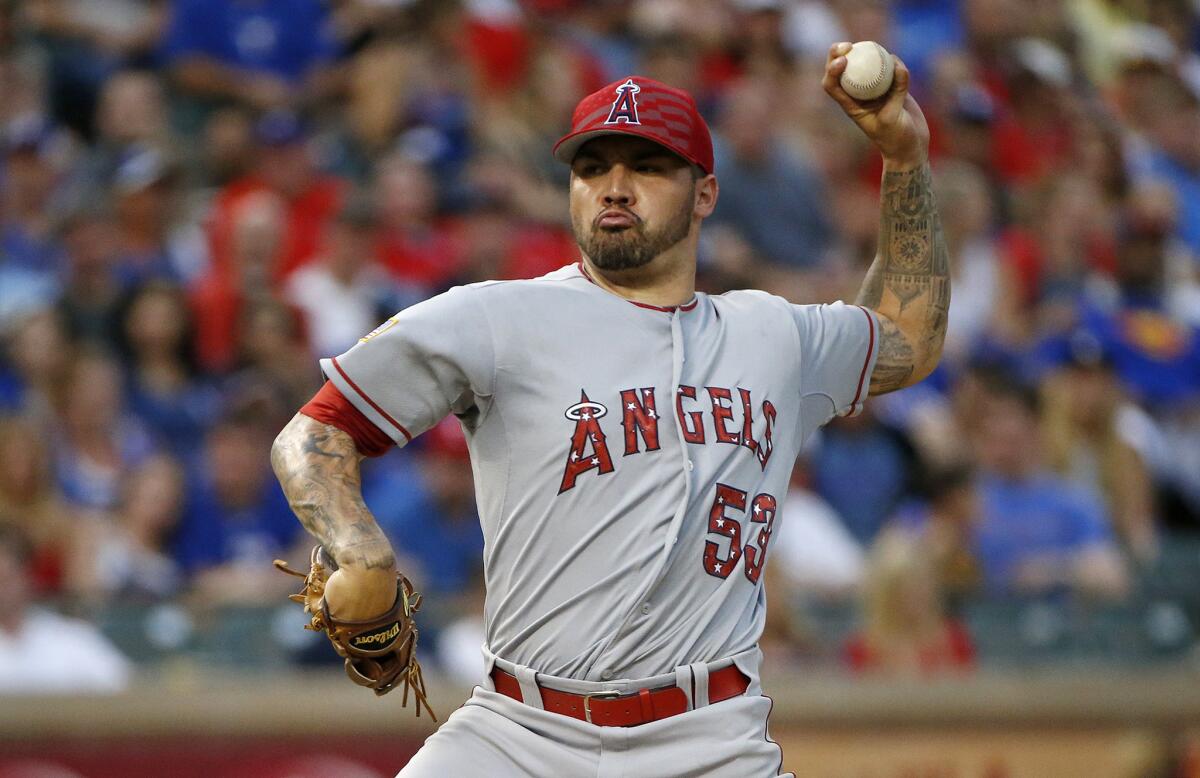Hector Santiago plays starring role in Angels’ 13-0 rout of Texas

Angels starter Hector Santiago gave up no runs and three hits in seven innings against Texas on Saturday night.
- Share via
ARLINGTON, Texas — Angels Manager Mike Scioscia was the first to greet Hector Santiago at the lip of the dugout after the seventh inning. He extended his hand for a fist bump.
Nearly half the team waited at the bottom of the steps. Before Santiago had even poured himself a cup of water, every last player in the dugout had come to slap him on the back.
Santiago just smiled. The temperature here was 88 degrees when the game started, but Santiago looked as if he’d completed a light workout. On a night when the Angels equaled their most lopsided victory of the season in a 13-0 wipeout of the Rangers, it was hard to tell what was better, the lineup’s hitting or Santiago’s pitching.
Santiago’s case: three hits allowed in seven shutout innings, the 11th time in 17 starts this year he’s given up zero or one runs in a start.
The turbulence that has buffeted the Angels off the field has stayed off the field. In the midst of a power struggle between Scioscia and general manager Jerry Dipoto that led to Dipoto’s resignation, and facing Josh Hamilton for the first time since owner Arte Moreno dumped him to the Rangers, the team might be playing its best baseball of the season.
The win, which featured a season-high 17 hits and a six-run sixth inning, clinched the Angels’ fourth series victory in a row, their longest streak of the season. They are five games over .500 (43-38) for the first time all year and four games off the Houston Astros’ lead in the American League West.
“I think we’re improving as a team,” Scioscia said. “We’ll keep going.”
For Santiago, this was nothing new. Last week, he outdueled former Cy Young Award winner Felix Hernandez in a 3-2 win over Seattle. His record is a modest 5-4, but his 2.40 earned-run average is fourth in the American League, and it makes a strong case for an All-Star selection.
Was that on his mind?
“I want to say no,” Santiago said. “But yeah.”
The league is starting to take notice. What has changed?
Before the game, Rangers Manager Jeff Banister just laughed.
“Well if we knew what made him so difficult to hit, it wouldn’t be a challenge,” he said.
Santiago is an interesting case. Over his career, he has outperformed his fielder-independent pitching, a statistic that, for most pitchers, predicts ERA. He has long described himself as “effectively wild.”
Until this season, his mechanics were sloppy and fluid, and his effectiveness came, in part, because no one knew where the ball was going to end up. That included Santiago.
In the off-season, Santiago built himself a mound at home, only it was skinnier, so he could stop himself from falling off to the side on his follow through. Before the season, he also worked with pitching coach Mike Butcher to clean up his delivery and make it more repeatable.
Scioscia called the tinkering the two have done “incredible,” if not quite textbook.
“His delivery certainly isn’t flawless, but it’s better,” Scioscia said. “So there’s going to be times when he’s trying to go glove-side down and miss arm-side up and away, he’s going to get a swing through. That’s still in there. But I think on a more consistent basis you have a good idea when you call a pitch there’s a better probability it’s going to be in that area.”
Santiago has been able to keep some of the unpredictability but cut down on walks. Command issues have kept him from lasting more than 71/3 innings this season, and his walk rate of 3.1 per nine innings is still the second-highest among Angels starters, but it’s the lowest of his career.
“That’s really the difference, whether he falls behind in counts or he’s ahead in counts, his ability to stay in them and not walk guys,” catcher Chris Iannetta said.
“He can put down whatever sign right now, and I’m like, ‘Yeah, let’s throw it.’ Two years ago, if you called a slider, I’m shaking off 100 times. A hundred out of 100 I’m shaking off. Now, I’m shaking to get to a slider.”
More to Read
Go beyond the scoreboard
Get the latest on L.A.'s teams in the daily Sports Report newsletter.
You may occasionally receive promotional content from the Los Angeles Times.







